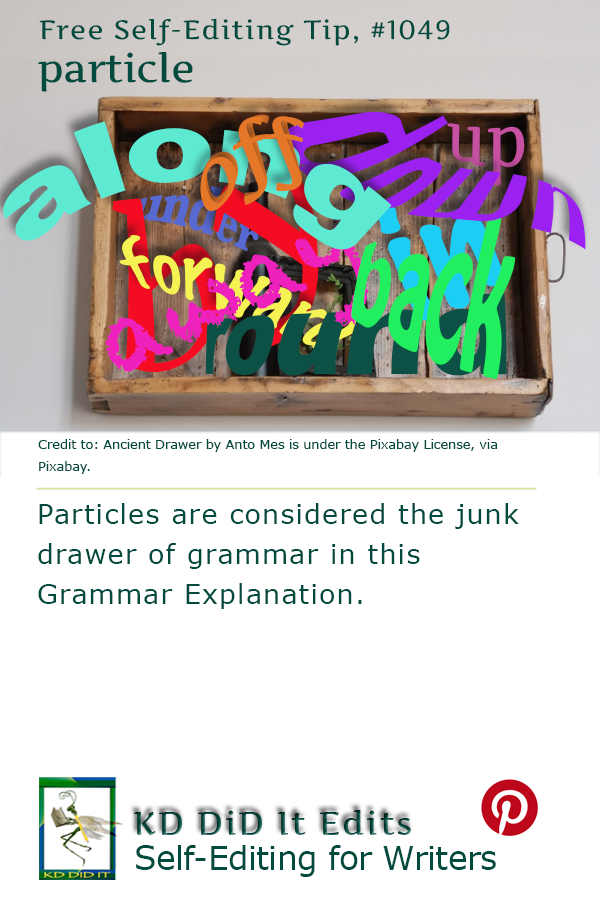Revised as of
14 Feb 2023
Particles are a mess, grammar-wise. Grammarians don’t seem to know what to put it, as particles do not easily fit into the established system of parts of speech. Think of the poor particle as the junk drawer of English.
A particle is usually a short word that doesn’t change its form through inflection.
See also “What’s in a Proper Name?“, “Prepositions“, and “Verbs“.
Grammar Explanations is . . .
. . . an evolving list of the structural rules and principles that determines where words are placed in phrases or sentences as well as how the language is spoken. Sometimes I run across an example that helps explain better or another “also known as”. Heck, there’s always a better way to explain it, so if it makes quicker and/or better sense, I would appreciate suggestions and comments from anyone on an area of grammar with which you struggle or on which you can contribute more understanding.
If you found this post on “Particle” interesting, consider subscribing to KD Did It, if you’d like to track this post for future updates.
| Particle | |||||||||||||||
| Part of Speech: Function word | |||||||||||||||
Definition: Particles are prepositions combined with verbs to add context to the sentence, express a mood, or indicate a specific action.
Abbreviated as ptcl |
|||||||||||||||
|
|||||||||||||||
| Adverb Particle | Rule: The most common particles are prepositions that become adverb particles when combined with a verb, forming phrasal (multi-word) verbs. | ||||||||||||||
|
Return to top or post contents |
blow up bog down break away bring up broke up burn down came by flip out found out give in go in for |
head out held up hold up in front of in spite of live down lived down look over look up make up near to |
pull through put in for shape up single out sleep in turn in turned up wind up wore out wrap up |
||||||||||||
| Examples: | |||||||||||||||
| He ate up all his dinner.
Sassy went away on a long trip. We will talk over the problem. Jimmy started out with sixty dollars. The airplane took off at 3 am precisely. Legend:
|
|||||||||||||||
| Discourse Particle | Rule: Discourse particles are more likely to be part of speech than writing and is used to direct or redirect the flow of conversation without adding any significant paraphrasable meaning to the discourse.
In addition, it could be argued that discourse particles fall under the banner of interjections. A.k.a. DM, discourse connective, discourse particle, filler, pragmatic marker, pragmatic particle |
||||||||||||||
|
Return to top or post contents |
ah anyway hey like |
oh you know well wow |
|||||||||||||
| Examples: | |||||||||||||||
| Now, who would like some dinner?
I was told I would be fired. Well, I will not accept that without a fight. Legend:
|
|||||||||||||||
| Infinitive Marker | Rule: When used as an infinitive marker, to is the particle.
A.k.a. grammatical particle |
||||||||||||||
|
Return to top or post contents |
I wanted to go to the movies.
Helen hopes to decide on her future soon. We are not going to go along with this any longer. Legend:
|
||||||||||||||
| Negative Particle | Rule: A negative particle uses not. | ||||||||||||||
|
Return to top or post contents |
We will not travel to Paris this summer.
The president does not have that authority. Legend:
|
||||||||||||||
| Proper Names | Rule: Part of a proper name. Names with particles are capitalized or in lowercase. Check a biographical dictionary, another authoritative source, or how that person spells his/her own name. | ||||||||||||||
|
Return to top or post contents |
|
||||||||||||||
Return to top or post contents
C’mon, get it out of your system, bitch, whine, moan . . . which words are your pet peeves? Also, please note that I try to be as accurate as I can, but mistakes happen or I miss something. Email me if you find errors, so I can fix them . . . and we’ll all benefit!
Satisfy your curiosity about other Grammar Explanations by exploring its homepage or more generally explore the index of self-editing posts. You may also want to explore Book Layout & Formatting Ideas, Formatting Tips, Grammar Explanations, Linguistics, Publishing Tips, the Properly Punctuated, Word Confusions, Writing Ideas and Resources, and Working Your Website.
Return to top or post contents
Resources for Particle
L, Michael. “Particle in Grammar.” Ginger Software 27 Nov 2019. Web. 29 Jan 2022. <https://www.gingersoftware.com/content/particle-grammar/&bt;.
“Understanding Verb Particles.” Grammar . n.d. Web. 29 Jan 2022. <https://www.grammarbook.com/blog/definitions/understanding-verb-particles/>.
Return to top or post contents
Pinterest Photo Credits:
Ancient Drawer by Anto Mes is under the Pixabay License, via Pixabay.


